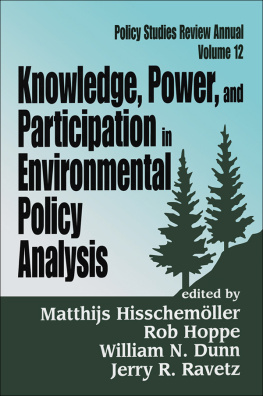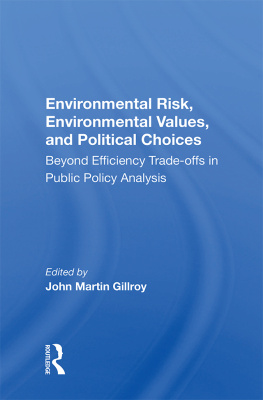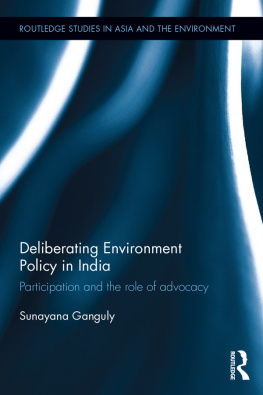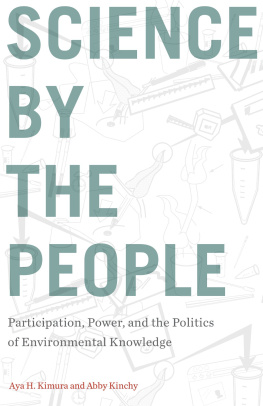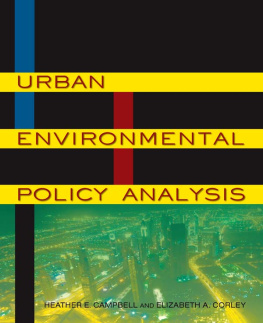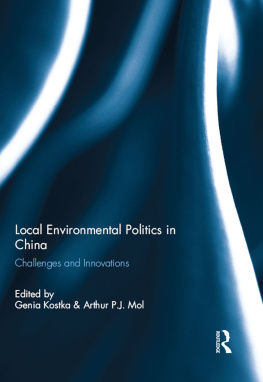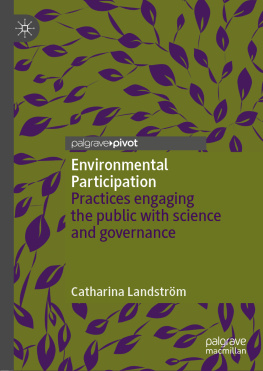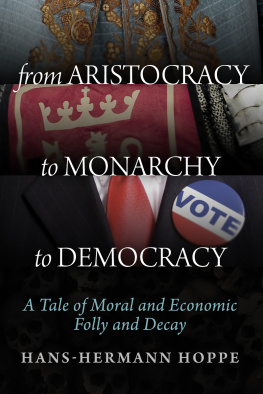Polcy Stades Review Annual
Volume 12
Knowledge, Power, and Participation in Environmental Policy Analysis
edited by
Matthijs Hisschemller
Rob Hoppe
William N. Dunn
Jerry R. Ravetz
First published 2001 by Transaction Publishers
Published 2017 by Routledge
2 Park Square, Milton Park, Abingdon, Oxon OX14 4RN
711 Third Avenue, New York, NY 10017
Routledge is an imprint of the Taylor and Francis Group, an informa business
Copyright 2001 by Taylor & Francis.
All rights reserved. No part of this book may be reprinted or reproduced or utilised in any form or by any electronic, mechanical, or other means, now known or hereafter invented, including photocopying and recording, or in any information storage or retrieval system, without permission in writing from the publishers.
Notice:
Product or corporate names may be trademarks or registered trademarks, and are used only for identification and explanation without intent to infringe.
ISSN: 0163-108X
ISBN 13: 978-0-7658-0076-3 (hbk)
Contents
Matthijs Hisschemller, Rob Hoppe,
William N. Dunn, and Jerry R. Ravetz
Frank Fischer
Matthijs Hisschemller and Rob Hoppe
Edward J. Woodhouse and Dean A. Nieusma
David Guston
Lee Botts, Paul Muldoon, Paul Botts, and Konrad von Moltke
Joyeeta Gupta
Angela Liberatore
Jaap Jelsma
Ian E. Taylor
Sheila Jasanoff
Solange Simoes
Cees J.H. Midden and Anneloes L. Meijnders
Jeroen van der Sluijs
Steven Yearley, John Forrester, and Peter Bailey
Elizabeth Shove and Michael Redclift
Arie Rip
William N. Dunn
Matthijs Hisschemoller, Rob Hoppe, Peter Groenewegen, and Cees J.H. Midden
Jerry R. Ravetz
1
Knowledge, Power, and Participation in Environmental Policy Analysis: An Introduction
M. Hisschemller, R. Hoppe, W. N. Dunn and J. R. Ravetz
Introduction
We live in a world that at once expects much of science, but comprehends little of its actual role in solving problems that lie at the intersection of scientific and technical knowledge, political power, and participation in public policy. Although many still cling to the naive assumption that the cognitive achievements of the natural and social sciences assure their social utility, the practical effects of scientific and technical knowledge are less direct than is commonly supposed. As Jevons suggests in his preface to Wealth from Knowledge (1972: xii), the sciences and professions are perhaps less the parents of technology and other vehicles for practical problem solving than anonymous well-wishers who send their gifts through the mail.
Knowledge, power, and participation are absolutely central to the understanding of any policy. But it is the area of environmental policy issues where, from the 1970s onwards, an impressive knowledge base has become available across various disciplines and research traditions. The process of rethinking scientific and political rationality is evident in developments within converging fields such as political science, including international relations, public administration and implementation studies; the utilization of knowledge tradition in the policy sciences; the sociology of science and technology; technology and integrated environmental assessment; and philosophy of science.
Rethinking Scientific and Political Rationality
The rethinking of scientific and political rationality is an unavoidable consequence of contradictions manifesting themselves fully in this stage of late capitalism and liberal democracy.
The first contradiction relates to the internal and external functioning of science. Internally, science is about the systematic and methodical suspension of belief, the falsification and corroboration of hypotheses, and progress toward the regulatory ideal of a changing and ever fallible truth. Externally, in the world of political and social practice, science shows its face as the authoritative, infallible, and incorrigible expert. In this image, science is Baumannslegislator of truth who, in Aaron Wildavskysapt words, speaks truth to power.
The internal/external contradiction translates into a second, political one. As scientific expertise is more and more frequently called upon by politicians and policymakers to solve complex, sometimes highly controversial, technical and social problems, politics and policymaking appear to be more science-driven and expert-dominated. Although a democratic faade can be upheld by formally ascribing to scientific experts an advisory status, the more successful these advisors are, the less democratic and more technocratic the system of governance becomes. Some observers, therefore, argue that the policy sciences project was fatally flawed from the beginning. One cannot advocate the professionalization of the policy sciences, while, at the same time, argue the case for a democracy in which the policy sciences have a leading role. The successful introduction of the policy sciences and policy analysis into politics and policymaking is in effect a means for fostering technocracy.
Others resist such a pessimistic conclusion and draw support for a more optimistic view from a third contradiction. The more politicians and policymakers call upon scientists to contribute authoritatively-perfected scientific truths, the more these same politicians and policymakers hear different truths that are fallible, contested, and imperfect. Expertise not only speaks in many tongues; it also makes frequently contradictory truth claims. Add to this that lay people are, after all, perspicacious enough to be aware of the prominent roles played by scientists in several twentieth-century catastrophes including the Holocaust, the nuclear and post-nuclear arms races, the global ecological crisis, and the totalitarian horrors of scientific socialism. The practical consequence is a loss of public and political credibility induced by a manifest gulf between the traditional image of scientific expertise (the legislator of truth) and the fact that well-meaning but differently trained experts regularly offer a panoply of conflicting knowledge claims. The resulting crisis, in both the ideological and political domains, is perhaps the main reason why so many politicians, policymakers, and policy scientists are rethinking scientific and political rationality and the role of expert knowledge in solving the pressing social problems of our time.
Diverging Perspectives in Environmental Policy Analysis
The contradictions articulated in the process of rethinking scientific and political rationality are addressed differently by colleagues working from various disciplinary perspectives and research traditions. What can be witnessed is a huge diversity of research problems, concepts, and approacheseven conflicting episte-mologies. But what they have in common is their struggle with at least that part of the contradictions which is related to the rethinking of scientific and political rationality. This is what makes them valuable for exploring the nexus of knowledge, power, and participation.
Political Science
In political science we are observing a shift from (neo)positivist and critical rationalist notions, the fact-value dichotomy in particular, to an emphasis on usable and ordinary knowledge, a revival of the (Lasswellian) notion of policy sciences of democracy, efforts to reformulate the idea of policy expertise, and a recognition that participation has epistemic functions (creating new knowledge) as well as a political one (distributing political power). The study of environmental policy has inspired policy scientists to address the contradiction between democratic theory and technocratic practice (in this volume the contributions by Fischer, by Hisschemller and Hoppe, and by Woodhouse and Nieusma). The study of environmental policy issues tends to bring about a convergence between research areas in political science that have stood apart for most of the twentieth century. The implications for political theory have drawn attention especially since the nuclear power issue provoked a flow of publications in the 1980s (for example, Dahl, 1985; Fischer, 1990).


